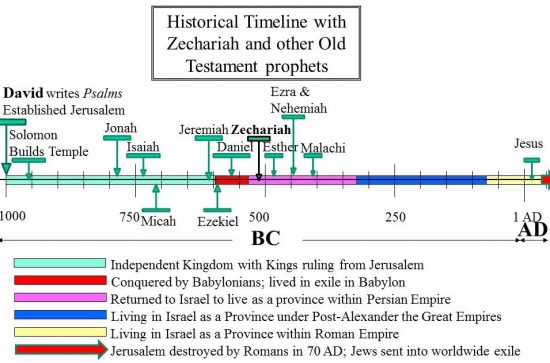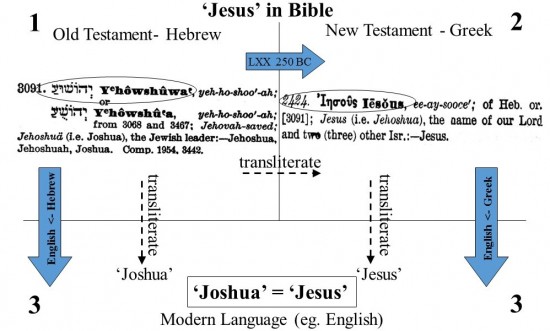Read and answer the questions in the boxes out loud and in English.
The Bible often talks about the future. The questions throughout this text will help you explore topics relating to the future and looking at five years from now.
We saw how Isaiah used the image of The Branch. A ‘he’ from the fallen dynasty of David, possessing wisdom and power was coming. Jeremiah followed up by stating that this Branch would be known as the LORD (the Old Testament name for God) himself.
Zechariah continues The Branch

The prophet Zechariah lived 520 BC, just after the Jewish people returned to Jerusalem from their first exile to Babylon. At that time, the Jewish people were rebuilding their destroyed temple. The High Priest then was a man named Joshua, and he was re-starting the work of priests. Zechariah, the prophet, was partnering with his colleague Joshua, the High Priest, in leading the Jewish people. Here is what God – through Zechariah- said about this Joshua:
‘”Listen O High Priest Joshua and your associates seated before you, who are men symbolic of things to come: I am going to bring my servant the Branch.” …, says the LORD Almighty, “and I will remove the sin of this land in a single day”.’ (Zechariah 3:8-9)
The Branch! Started by Isaiah 200 years before, continued by Jeremiah 60 years earlier, Zechariah carries on further with ‘The Branch’. Here the Branch is also called ‘my servant’. In some way the High Priest Joshua in Jerusalem at 520BC, colleague of Zechariah, was symbolic of this coming Branch. But how? It says that in ‘a single day’ the sins will be removed by the LORD. How would that happen?
1. What do I want to do five years from now?
– Where do I want to live?
– Do I want to be married?
– Do I want to have children?
– Do I want to be in a career?
– Do I want to develop a hobby or skill? If so, what kind?
2. What do you want to be five years from now?
– Are there any changes you’d like to make in yourself?
– What kind of character do you want to have?
The Branch: Uniting Priest and King
Zechariah explains later. To understand we need to know that the roles of Priest and King were strictly separated in the Old Testament. None of the Davidic Kings could be priests, and the priests could not be kings. The role of the priest was to mediate between God and man by offering animal sacrifices to God for atonement of sins, and the job of the King was to rule with justice from the throne. Both were crucial; both were distinct. Yet Zechariah wrote that in the future:
‘The word of the LORD came to me: “…Take the silver and gold and make a crown, and set it on the head of the high priest Joshua. Tell him this is what the LORD Almighty says, ‘Here is the man whose name is the Branch, and he will branch out from his place and build the temple of the LORD… and he will be clothed with majesty and will sit and rule on his throne. And he will be a priest on his throne. And there will be harmony between the two’’ (Zechariah 6:9-13)
Here, against all previous rules, the high priest in Zechariah’s day (Joshua) is to put on the kingly crown symbolically as the Branch. Remember Joshua was ‘symbolic of things to come’. Joshua, the High Priest, in putting on the kingly crown, foresaw a future uniting of the King and Priest into one person – a priest on the King’s throne. Furthermore, Zechariah wrote that ‘Joshua’ was the name of the Branch. What did that mean?
3. Are you now the person you wanted to be five years ago? Are you doing the things you wanted to be doing five years ago? Why or why not?
4. What will you do tomorrow that will move you toward your five-year goals?
5. What kinds of obstacles might keep you from reaching your goals?
The name ‘Joshua’ is the name ‘Jesus’
To understand this we need to review the history of Old Testament translation. In 250 BC the Hebrew Old Testament was translated into Greek. This translation is still in use today and is called the Septuagint (or LXX). The title ‘Christ’ was first used in this Greek translation, making ‘Christ’=’Messiah’=’Anointed One’. (You can review this here ).

As you can see in the figure Joshua is an English transliteration of the original Hebrew name ‘Yhowshuwa’ which was a common Hebrew name that meant ‘Jehovah saves’. This (shown in Quadrant #1) is how Zechariah wrote ‘Joshua’ in 520 BC. It is transliterated to ‘Joshua’ when the Old Testament is translated into English (bottom half labelled #3). The translators of the LXX in 250 BC also transliterated Yhowshuwa when they translated the Old Testament into Greek. Their Greek transliteration was Iesous (Quadrant #2). Thus ‘Yhowshuwa’ of the Old Testament was called Iesous in the LXX. Jesus was called Yhowshuwa when people spoke to him, but when the New Testament writers wrote the Greek New Testament, they used the familiar ‘Iesous’ of the LXX to refer to him. When the New Testament was translated from the Greek to English (#2 -> #3) ‘Iesous’ was transliterated (again) to our well-known English ‘Jesus’ (bottom half labelled #3). Thus the name ‘Jesus’ = ‘Joshua’. Both Jesus of the New Testament, and Joshua the High Priest of 520BC were called ‘Yhowshuwa’ in their native Hebrew. In Greek, both names were ‘Iesous’. A reader of the Greek Old Testament LXX would recognize the name of Iesous (Jesus) as a familiar name in the Old Testament. It is harder for us to see the connection since the name ‘Jesus’ seems to appear as brand new. But the name Jesus does have an Old Testament equivalent – Joshua.
6. How often do you change your goals for the future?
7. Are you sometimes happy when you don’t meet your goals because your life turned in a different but more interesting direction than you planned? Give examples.
Jesus of Nazareth is the Branch
Now the prophecy of Zechariah makes sense. This is a prediction, made in 520 BCE, that the name of the coming Branch would be ‘Jesus’, pointing directly to Jesus of Nazareth.
This coming Jesus, according to Zechariah, would unite the King and Priest roles. What was it that the priests did? On behalf of the people they offered sacrifices to God to atone for sins. The priest covered the sins of the people by sacrifice. Similarly, the coming Branch ‘Jesus’ was going to bring a sacrifice so that the LORD could ‘remove the sin of this land in a single day’ – the day Jesus offered himself as the sacrifice.
Jesus of Nazareth is well-known outside the gospels. The Jewish Talmud, Josephus and all other historical writers about Jesus, both friend and enemy, always referred to him as ‘Jesus’ or ‘Christ’, so his name was not invented in the Gospels. But Zechariah predicted his name 500 years before he lived.
Jesus comes ‘from the stump of Jesse’ since Jesse and David were his ancestors. Jesus possessed wisdom and understanding to a degree that sets him apart from others. His shrewdness, poise and insight continue to impress both critics and followers. His power through miracles in the gospels is undeniable. One may choose not to believe them; but one cannot ignore them. Jesus fits the quality of possessing exceptional wisdom and power that Isaiah predicted would one day come from this Branch.
Now think of the life of Jesus of Nazareth. He certainly claimed to be a king – The King in fact. This is what ‘Christ‘ means. But what he did while on earth was actually priestly. The priest’s job was to offer acceptable sacrifices on behalf of the Jewish people. The death of Jesus was significant in that, it also, was an offering to God, on our behalf. His death atones for the sin and guilt for any person, not just for the Jew. The sins of the land were literally removed ‘in a single day’ as Zechariah had predicted – the day Jesus died and paid for all sins. In his death he fulfilled all the requirements as Priest, even as he is mostly known as ‘The Christ’ or The King. He did bring the two roles together. The Branch, the one that David long ago called the ‘Christ’, is the Priest-King. And his name was predicted 500 years before his birth by Zechariah.
Common Expressions
Below you can find common English expressions that are used when talking about the future.
“Game plan” – a plan for achieving success, especially in business or politics.
Example: “We have to make major growth this year. What’s the game plan?”
“Seize the day” – said when you are advising someone to do what they want to do right away, and not to worry about the future
Example: “Seize the day. Don’t waste your life.”
“Plan on it” – to be ready for something; to prepare for something.
Example: “If I were you, I would plan on a big crowd at your open house..”